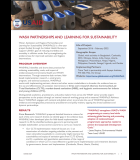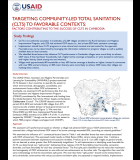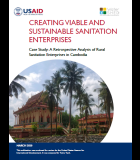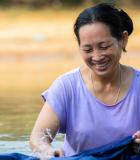Improved Basic Education in Cambodia Project (IBECP)
When the IBEC project was developed, Cambodia’s education system was affected by a weak publicsector service-delivery system, nominal teacher capacity, lack of adequate school facilities, poor governance, and lack of quality teaching and learning resources. Of all primary and lower secondary schools, almost 50 percent of them did not have clean water, and approximately 20 percent did not have toilets. These factors resulted in low enrollment levels and high drop-out rates, especially at the lower secondary level and higher. Repetition and absenteeism were also a major concern and vulnerable children, particularly girls, the disabled, and minorities, were at risk of being deprived of an education. Lower secondary enrollment rates were near 35%, which put Cambodia globally in the bottom 20 countries worldwide.
The strategic objective of this five-year project, which began in 2009 and will end in 2014, is to improve access, quality, and relevance of basic education in Cambodia. More specifically, the IBEC project is to increase lower secondary school enrollments, retention, and completion rates, providing Cambodia’s adolescent youth population with an opportunity to be better educated and lead productive lives. The IBEC project targets selected schools in three provinces, Kampong Cham, Kratie and Siem Reap.
Activity Description
Local NGO and Government Capacity Building & Advocacy for Sustainability: IBEC accomplishes this by training, coaching, and monitoring its sub-grantee, Kampuchea Action for Primary Education (KAPE). The core themes covered in the trainings are: a) Organizational Management, b) Program Management, c) Project Performance Management, d) Governance, e) Administration, f) Human Resource Management, and g) Financial Management.
More Equitable School Access: IBEC provides scholarships for youth from underserved populations who are poor, belong to ethnic and religious minorities, or are handicapped. The scholarships provided are in the form of bicycles, clothing, school supplies, and monetary support. IBEC is also improving access to school by building temporary classrooms to accommodate more students. Other school improvements may range from building wells for drinking water, latrines, or other facilities for sanitation purposes. Access to education is also improving by recruiting teachers from the local community.
Improved School Management and Community involvement: IBEC provides training to school principals on leadership and management skills and supports the Parent Teacher Associations in the project’s target schools. IBEC programming is aimed towards training school managers to identify priorities, develop proposals and budgets, develop and implement maintenance plans, and to effectively advocate for grants from the Cambodian government and other potential donors.
Improved Educational Relevance: IBEC developed and piloted a Life Skills curriculum composed of 30 modules on different relevant topics. This curriculum has been adopted by the Ministry of Education, Youth, and Sports (MoEYS). The project works closely with community, including commune councils, to improve their engagement and ownership.
Expected Outcomes
• Increased enrollment, retention, promotion, and completion rates of youth from underserved populations
• More relevant lower secondary life skills curriculum
• Increased schools’ capacity to deliver a quality education
Actual Outcomes
• Dropout rates have generally been reduced in target schools
• Improvements in quality of education are reflected in reduced pupil-teacher ratios in IBEC schools
• Much of the training of teachers and capacity building of school directors to advance relevance and to support the Life Skills program in IBEC has also improved the general quality of teaching and management at target schools as measured by IBEC performance standards, according to interviewed stakeholders’ perceptions.
• IBEC has introduced a significant innovation of "development readiness" tiers, as a way to direct resources to schools that prove to be most effective in utilizing the support properly





